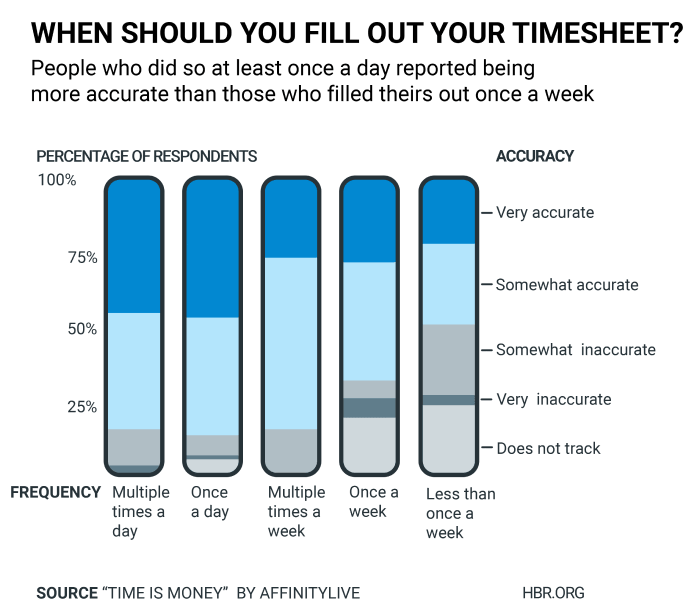We’ve all heard the expression “Time is money”, but how much money are we exactly talking about?
In this blog post, we’ll talk about how much money time tracking can save you according to research, as well as how exactly it saves you money. We’ll also provide tips to track time as effectively as possible.
Table of Contents
How much money can time tracking save you?
According to a study done by AffinityLive, published in Harvard Business Review, working ineffectively costs the US economy over 50 million lost hours, which means losing around 7.4 billion dollars per day.
It also states that “moving from weekly (or worse) timesheet updates to daily (or better) would recover $52,000 per professional, per year in billable time.”
To put things in perspective, here’s what you could buy with the extra $52,000 (if they hadn’t gone with the wind):
- 50 iPhone 12 Pros
- A 2 nights stay in a Royal Suite at Burj Al Arab hotel in Dubai
- A 3-carat diamond
- A house or an apartment (size depends on the location)
- One year tuition fees at Harvard University
And after buying something from this list, you would still have a couple of thousands left to spare.
I think we can all agree that it’s a lot of money – that should not be wasted just like that.
How time tracking saves you money
Time tracking software saves your money in various ways, especially if you choose an app that’s high-quality and completely free, like Clockify. Here’s how:
- You have actual data in front of you, instead of estimates. It’s not a stellar idea to rely on guesswork when it comes to business.
When you track time, you have an insight into everything that is going on, including all the tasks and the time spent to complete those tasks. Even if you do have to make an estimate (for a big future project, for example), you will have a lot of data to rely on and make a guess that’s as accurate as possible.
You will also be able to tell if there’s a particular project that wastes the company’s resources – when you track time, you can see exactly where your money is going. This brings us to the next point… - It facilitates accurate billing and processing data for payroll and invoices since there is a record of all billable and non-billable hours.
- Avoid legal issues. Speaking about payroll data – in 2013, IRS issued 4.5 billion dollars in penalties related to payroll taxes. Time tracking will decrease the risk of being part of a similar statistic.
- It increases productivity. It helps with focus and keeping priorities straight, as well as minimizing idle work.
It also prevents overworking. And when someone is well-rested, they’re much more likely to perform well and be more efficient. - It saves time, compared to outdated attendance systems. In comparison between the two, there’s also less space for human error.
- Digital time tracking means not wasting environmental resources like paper nor additional money to restock them once they’re all used. Did you know that, according to the University of South Indiana, approximately 1 billion trees worth of paper are thrown each year in the US? Using time tracking software means saving not only your money but the trees too.
Tips for effective time tracking
Here are some tips to time track effectively and, consequently, save money:
Track time every day
AffinityLive’s study states that “according to the Ebbinghaus Forgetting Curve, humans only retain 23 percent of what they learn after six days. This means that it’s impossible to be completely accurate with your timesheet if you’re only completing it once a week.”
That’s why it’s best to track time every day, as higher frequency results in better accuracy.

Be consistent
It’s as important to track time consistently for a longer period, as it is to track it regularly. You have to stick to it for it to be effective!
Also, make sure there is consistency in terms of everyone tracking time on the same platform, so you can have all data in one place.
Make time tracking fast and easy
“We found, unsurprisingly, that the main reason professionals have poor time tracking habits is that it is cumbersome to do”, says AffinityLive’s study.
A general rule of thumb is the more complicated it is, people are less likely to do it.
That’s why you should opt for a time tracking software that doesn’t take much time out of the day and doesn’t require a lot of effort.
Automated tracking is a great option – the only thing you have to do is to click a button to start recording. You can even set a reminder to make sure you won’t forget to start tracking.
You can also use timesheets where you manually add tasks (usually at the end of the workday) if it suits your company’s needs better. They have a user-friendly and intuitive interface and they’re easy to use, as well.
Give clear instructions
Following up on what we just said, it’s really important to provide clear and simple instructions when introducing new software. Otherwise, it can be stressful, especially for less tech-savvy people.
Expectations should also be discussed, for example, the expected daily workload or if there’s a certain way the tasks should be organized.
Round the time
While it’s important to track your time accurately, there is often no need for an extremely high level of precision; worrying about tracking every minute down to a tee can cause unnecessary stress and do more harm than good. Time is usually rounded to the nearest 5, 10, or 15 minutes.
You also don’t need to track things like bathroom breaks or going to the kitchen to grab a snack.
If you wonder if time rounding is legal – yes, it is, as long as it’s done correctly.
Conclusion
We can’t tell you the exact figures your company can save as it depends on many factors, such as its size and the number of employees. However, with everything we’ve mentioned in mind, it may be easier to calculate how you can cut the costs and/or make adjustments to your budget and make your company more profitable.
For time tracking to be effective, it’s best to do it daily and consistently and to choose the right software that will fit your company’s needs perfectly.


